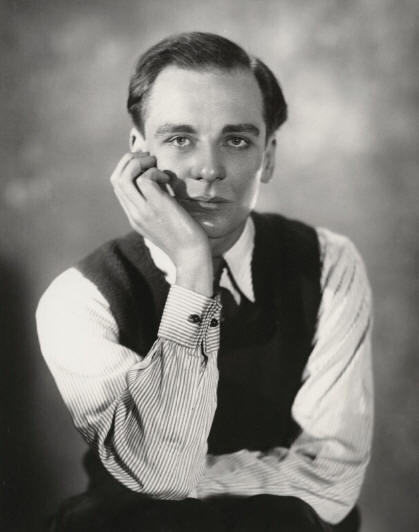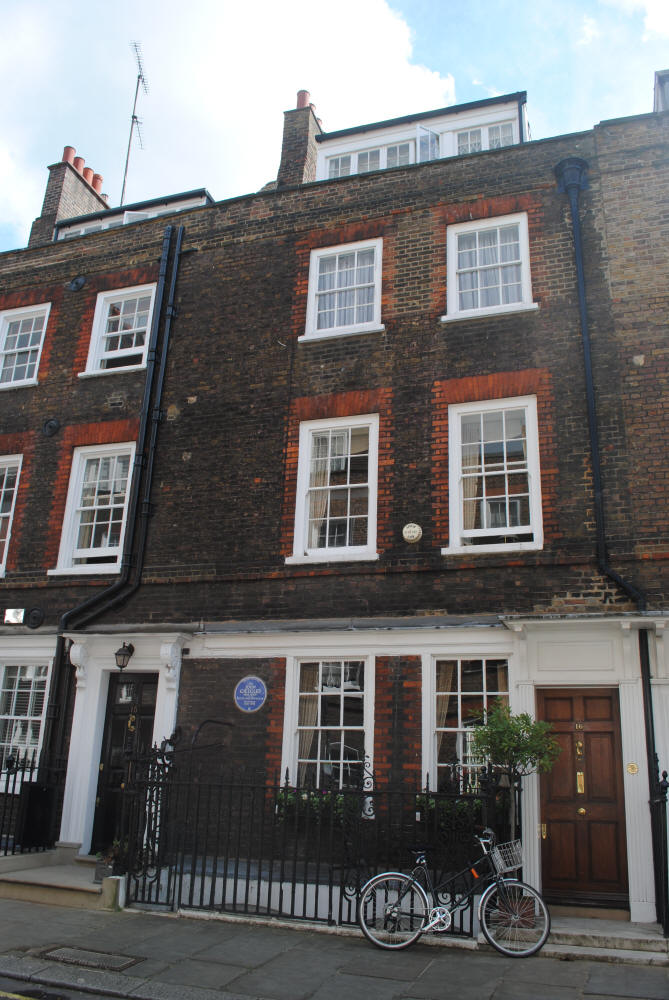BURIED TOGETHER
Partner John Perry,
Paul Anstee, Martin Hensler
Queer Places:
36 Earls Court Square, Earl's Court, London SW5 9DQ
Westminster School, Little Dean's Yard, Great Smith St, Westminster, London SW1P 3PF, Regno Unito
Royal Academy of Dramatic Art, 62-64 Gower St, Bloomsbury, London WC1E 6ED, Regno Unito
127 Long Acre, Covent Garden WC2E 9AA,
UK
Wychwood, Church Road, Barcombe, Lewes, East Sussex BN8 5TP, UK
16 Cowley St, Westminster, London SW1P 3LZ, Regno Unito
7 Upper St Martin's Ln, London WC2H 9DL, Regno Unito
Ffuleslo, Finchingfield, Braintree CM7 4NZ, Regno Unito
Wotton House, Wotton Underwood, Aylesbury HP18 0SB, Regno Unito
Oxford Crematorium, Bayswater Road, Headington, Oxford OX3 9RZ, Regno Unito
 Sir Arthur John Gielgud OM CH (14 April 1904 – 21 May 2000) was an English
actor and theatre director whose career spanned eight decades. With Ralph
Richardson and
Laurence Olivier, he was one of the trio of actors who dominated the
British stage for much of the 20th century. A member of the Terry family
theatrical dynasty, he gained his first paid acting work as a junior member of
his cousin Phyllis Neilson-Terry's company in 1922. After studying at the
Royal Academy of Dramatic Art he worked in repertory theatre and in the West
End before establishing himself at the Old Vic as an exponent of Shakespeare
in 1929–31.
Sir Arthur John Gielgud OM CH (14 April 1904 – 21 May 2000) was an English
actor and theatre director whose career spanned eight decades. With Ralph
Richardson and
Laurence Olivier, he was one of the trio of actors who dominated the
British stage for much of the 20th century. A member of the Terry family
theatrical dynasty, he gained his first paid acting work as a junior member of
his cousin Phyllis Neilson-Terry's company in 1922. After studying at the
Royal Academy of Dramatic Art he worked in repertory theatre and in the West
End before establishing himself at the Old Vic as an exponent of Shakespeare
in 1929–31.
During the 1930s Gielgud was a stage star in the West End and on Broadway,
appearing in new works and classics. He began a parallel career as a director,
and set up his own company at the Queen's Theatre, London. He was regarded by
many as the finest Hamlet of his era, and was also known for high comedy roles
such as John Worthing in The Importance of Being Earnest. In the 1950s
Gielgud feared that his career was threatened when he was convicted and fined
for a homosexual offence, but his colleagues and the public supported him
loyally. When
avant-garde plays began to supersede traditional West End
productions in the later 1950s he found no new suitable stage roles, and for
several years he was best known in the theatre for his one-man Shakespeare
show Ages of Man. From the late 1960s he found new plays that suited
him, by authors including Alan Bennett, David Storey and Harold Pinter.
During the first half of his career, Gielgud did not take the cinema
seriously. Though he made his first film in 1924, and had successes with
The Good Companions (1933) and Julius Caesar (1953), he did not
begin a regular film career until his sixties. Gielgud appeared in more than
sixty films between Becket (1964), for which he received his first
Academy Award nomination for playing Louis VII of France, and Elizabeth
(1998). As the acid-tongued Hobson in Arthur (1981) he won the Academy
Award for Best Supporting Actor. His film work further earned him a Golden
Globe Award and two BAFTAs.

by Carl Van Vechten

John Gielgud
by Paul Tanqueray
bromide print, 1932
9 1/2 in. x 7 1/2 in. (240 mm x 189 mm)
Given by Paul Tanqueray, 1974
Photographs Collection
NPG x15485

clare atwood (1866-1962) ‘john gielgud’s room’ 1933

16 Cowley St, Westminster
Although largely indifferent to awards, Gielgud had the rare distinction of
winning an Oscar, an Emmy, a Grammy, and a Tony. He was famous from the start
of his career for his voice and his mastery of Shakespearean verse. He
broadcast more than a hundred radio and television dramas between 1929 and
1994, and made commercial recordings of many plays, including ten of
Shakespeare's. Among his honours, he was knighted in 1953 and the Gielgud
Theatre was named after him. From 1977 to 1989, he was president of the Royal
Academy of Dramatic Art.
Paul Anstee was one of three great loves in Sir John Gielgud's life, the first being
John Perry, who worked for and later lived with Hugh "Binkie" Beaumont at HM Tennent impresarios, and the last a possessive Hungarian, Martin Hensler. Gielgud's Letters, 800-plus missives, written between 1912 and 1999, are with his mother, his onetime lover Paul Anstee, the actress Irene Worth, photographer and designer
Cecil Beaton and the playwright Hugh Wheeler. The early part of the volume is dominated by correspondence to his mother (the only family member who figures prominently), and is full of excited career talk as he achieves success. Then comes the romance with Anstee — tarnished by Anstee's jealousy and Gielgud's insistence that "I can't really share my life completely with anybody." Finally, true love arrives with a Hungarian, Martin Hensler, and Gielgud's letters become saturated with a new, blissful sense of mutual dependence.
During his relationship with Gielgud, which flourished for several years from 1953,
Anstee opened an interior decorating and antiques shop in the King's Road, partly financed by his father and briefly by the actress Adrianne Allen, wife of Raymond Massey. The shop opened in October 1955, giving him pleasure and hard work in equal measure. In September 1961 he opened a design shop in Cale Street, with favourable publicity, retaining for a few further years the King's Road shop solely for antiques.
He travelled frequently with Gielgud, mixing with figures such as
Truman Capote and
Somerset Maugham. But in June 1956 his relationship with Gielgud became troubled after the actor revealed that he was still occasionally involved with
George Pitcher, a Princeton professor of philosophy with a long-term partner – the composer
Ed Cone.
Gielgud found it hard to relinquish Pitcher, despite his devotion to Anstee, something he explained as "the worst kind of Rex Harrison compromise". "I do feel such a treacherous bitch," the actor confessed. Gielgud and Anstee remained lovers, and by 1958 Gielgud was less concerned about whether his infidelities remained secret. Seizing a week with Pitcher in America that year, Gielgud told a friend: "I cannot be bothered with intrigues, lies and subsequent recriminations."
In 1959 Anstee supported Gielgud through a blackmail attempt made on him in New York, reminiscent of the cottaging incident in London in 1953 when Gielgud was arrested for approaching a man in a public lavatory who turned out to be an undercover policeman. But Gielgud continued to demand independence and, in October 1962, picked up a young Hungarian, Martin Hensler, at an art exhibition.
From being an "agreeable once a week diversion", Hensler soon became Gielgud's partner, staying with him for 37 years until he predeceased the actor in 1999. By this time the relationship with Anstee had settled into one of close companionship, Gielgud confiding in him about Hensler and welcoming Anstee's friendliness towards his successor. Anstee remained steadfast in his devotion to Gielgud, and such was the mutual trust that Gielgud appointed him his executor.
Hensler was temperamental, and
Gielgud's friends often found him difficult, but the two became a long-term
couple and lived together until Hensler's death. Under his influence Gielgud
moved his main residence from central London to Wotton Underwood in
Buckinghamshire.[154][155]
Gielgud's companion of forty years, Martin Hensler, died in 1999. After
this, Gielgud went into a physical and psychological decline;[191]
he died at home in May the following year, at the age of 96. At his request
there was no memorial service, and his funeral at Wotton parish church was
private, for family and close friends.[192]
His ashes were scattered in the rose garden of his home, where those of Martin
Hensler had been sprinkled after his death the previous year.[193]
My published books:


BACK TO HOME PAGE

 Sir Arthur John Gielgud OM CH (14 April 1904 – 21 May 2000) was an English
actor and theatre director whose career spanned eight decades. With Ralph
Richardson and
Laurence Olivier, he was one of the trio of actors who dominated the
British stage for much of the 20th century. A member of the Terry family
theatrical dynasty, he gained his first paid acting work as a junior member of
his cousin Phyllis Neilson-Terry's company in 1922. After studying at the
Royal Academy of Dramatic Art he worked in repertory theatre and in the West
End before establishing himself at the Old Vic as an exponent of Shakespeare
in 1929–31.
Sir Arthur John Gielgud OM CH (14 April 1904 – 21 May 2000) was an English
actor and theatre director whose career spanned eight decades. With Ralph
Richardson and
Laurence Olivier, he was one of the trio of actors who dominated the
British stage for much of the 20th century. A member of the Terry family
theatrical dynasty, he gained his first paid acting work as a junior member of
his cousin Phyllis Neilson-Terry's company in 1922. After studying at the
Royal Academy of Dramatic Art he worked in repertory theatre and in the West
End before establishing himself at the Old Vic as an exponent of Shakespeare
in 1929–31.




